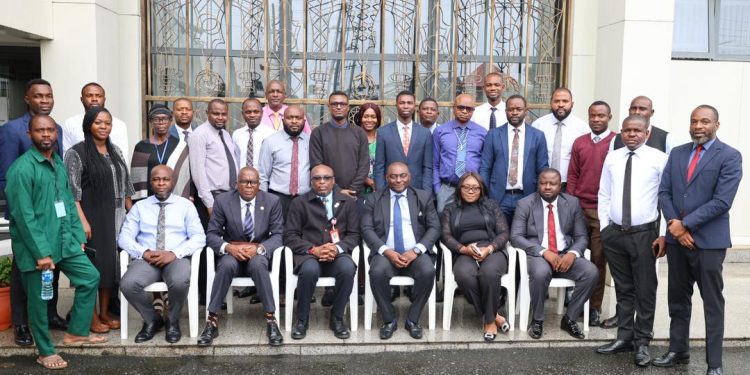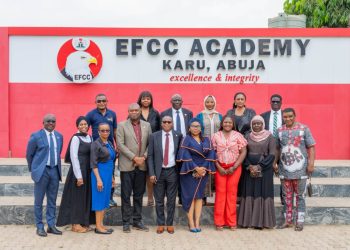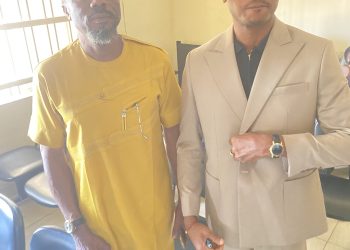By Nkechi Eze
Operatives of the Benin Zonal Directorate of the Economic and Financial Crimes Commission (EFCC) on Thursday, July 24, 2025, held a sensitization session for officers of the Central Bank of Nigeria (CBN), Benin Branch, focusing on the threats posed by virtual assets, money laundering, and terrorism financing.
The awareness lecture, held at the CBN’s Benin office, was organized at the request of the apex bank as part of its internal knowledge-sharing efforts. According to a statement issued by EFCC spokesperson, Dele Oyewale, the event featured detailed presentations by officials of the EFCC’s Special Control Unit against Money Laundering (SCUML).
Delivering a lecture on the basics of money laundering and terrorism financing, Superintendent of the EFCC and Head of SCUML in the Benin Zonal Directorate, Ibrahim Boyi, described money laundering as “the process of transforming ill-gotten wealth so that it may appear legitimate.” He explained that terrorism financing could take the form of cash provision, logistical support, provision of training, accommodation, or other services that aid terrorist operations.
Boyi outlined the three traditional stages of money laundering placement, layering, and integration and emphasized the devastating impact of the crime on national economies. He listed consequences such as destabilization of the financial system, loss of foreign direct investment, reputational damage, economic stagnation, and underdevelopment. He reminded participants that Nigeria is a signatory to several international conventions and treaties aimed at combating financial crimes.
“Nigeria made a high-level political commitment to work with the Financial Action Task Force (FATF) and GIABA to strengthen its Anti-Money Laundering and Combating the Financing of Terrorism (AML/CFT) regime,” Boyi noted. “Our official entry into FATF in 2003 marked a significant milestone in the country’s efforts to combat financial crimes.”
Another speaker, Deputy Superintendent of the EFCC, Joshua Abiama, gave an in-depth presentation on “The Use of Cryptocurrency in Money Laundering and Terrorist Financing.” He described cryptocurrency as a digital representation of value that can be digitally traded and serve as a medium of exchange, a unit of account, and a store of value, even though it is not legal tender in most jurisdictions.
Abiama identified Bitcoin as the first cryptocurrency to be created and noted that its decentralized nature and reliance on blockchain technology allow users to conduct transactions without the need for intermediaries or central authorities. These attributes, he said, coupled with high levels of anonymity and the absence of traditional due diligence protocols such as Know Your Customer (KYC) requirements, make virtual currencies appealing to criminals.
“Virtual currencies like Bitcoin have become attractive to terrorists who use them to solicit donations, purchase and sell weapons on the Dark Web, and move funds globally,” Abiama warned.
In his closing remarks, the Acting Director of the EFCC’s Benin Zonal Directorate, ACE I Effa Okim, reaffirmed the Commission’s commitment to partnering with relevant institutions to close any gaps that could be exploited by fraudsters. “The EFCC will continue to collaborate with stakeholders to deepen awareness and enhance our collective response to economic and financial crimes,” he said.
Commending the Commission for its impactful presentation, Akpanke Utande, the Benin Branch Controller of the CBN, described the lecture as invaluable and insightful. He noted that the session had greatly improved the participants’ understanding of the AML/CFT framework, financial crime risks, and the applicable legal instruments.
Also speaking, Mrs. O.B. Smooth, Head of the CBN’s Currency Management Centre in Benin, thanked the EFCC for its participation. She explained that the Benin Branch of the CBN hosts monthly Knowledge Sharing Sessions for its staff and that it was necessary to invite the EFCC for the July edition due to its expertise in tackling financial crimes.
“Thank you so much for your lecture at our Knowledge Sharing Session for the month of July 2025, which has offered us the opportunity to share ideas with our relevant stakeholders in Edo State,” she said.















